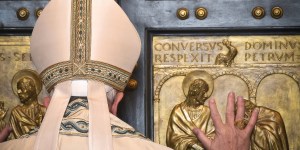Just a few months before the opening of the 2025 Jubilee that is expected to bring several million people to Rome, Pope Francis visited the offices of Rome's mayor on June 10, 2024. In this, his second visit to the Eternal City's administration after a 2019 stop, the Pope encouraged the city to see the preparations for the Jubilee as “an opportunity for development” and not "a burden."
Rome is encumbered by construction work in preparation for the Jubilee.
On an early Monday morning, Pope Francis made his way to the famous hill overlooking the ancient imperial forums, where he was welcomed by Rome's mayor Roberto Gualtieri.
After a private meeting with the first citizen, in the Palazzo Senatorio, where the municipality has been based since the 12th century, the Pope met the city's councillors, assessors, and authorities.

In his address to the elected representatives, the Bishop of Rome spoke of the preparations for the Great Jubilee, which is expected to attract some 32 million faithful to the Eternal City, according to Vatican figures. For months now, the city of Rome has been an open-air construction site, with stations being renovated and tunnels built to ease traffic in the historic center.
Pope Francis stressed that this religious event, which opens on December 24, will have a “positive impact” on the whole city, motivating it to “make public services more efficient.” And in particular, the Jubilee is encouraging better links between the center and the outskirts of this sprawling city, extending far beyond its historic walls.
The management of Rome, in terms of infrastructure and public services, is often the target of harsh criticism.
“The enormous influx of pilgrims, tourists, and migrants […] could be seen as an encumbrance, a burden that slows down and hinders the normal course of things,” admitted the Pontiff. But, he assured , Rome's problems are “the flip side of its greatness” and can become “an opportunity for development: civil, social, economic, cultural.”
“Authority is fully realized when it places itself at the service of all, when it uses its legitimate power to respond to the needs of citizens and, in particular, of the weakest,” the Pope reflected. Breaking away from his notes for a moment, he also assured that relations between Italy and the Holy See were “human relations.”
“Pettiness can make people think that these are relations of money, but no, that's secondary,” he asserted, triggering applause.
Defending human dignity
Peter's Successor also returned to the history of Rome, its birth 2,800 years ago, and the arrival of Christianity. The Christian message enabled ancient institutions “to evolve towards a higher stage, gradually abandoning […] slavery,” noted the Pope, pointing out in passing that “even refined civilizations can present elements […] contrary to the dignity of the human being.”
Today too, he continued, “almost unconsciously, we sometimes run the risk of being selective and partial in our defense of human dignity, marginalizing or excluding certain categories of people.” While he did not go into further detail with this reference, the Pope often pleads for the protection of the most vulnerable in Italy, including the elderly and the unborn.
Finally, the 266th Pope spoke of the “Rome of the Popes,” which succeeded the “Rome of the Caesars.” He acknowledged the “not very happy behavior” of certain popes who, over the centuries, have “had to play a role in replacing the civil powers.”
The Argentine pontiff, who left his signature on the visitors' book during the visit, presented Rome with a mosaic - created by the Vatican workshop - depicting Titus' Ark, and blessed a plaque commemorating his visit.
This was his second visit to the Capitoline Hill since his election in 2013. Francis was welcomed there on March 26, 2019, by the then mayor of Rome, Virginia Raggi.


